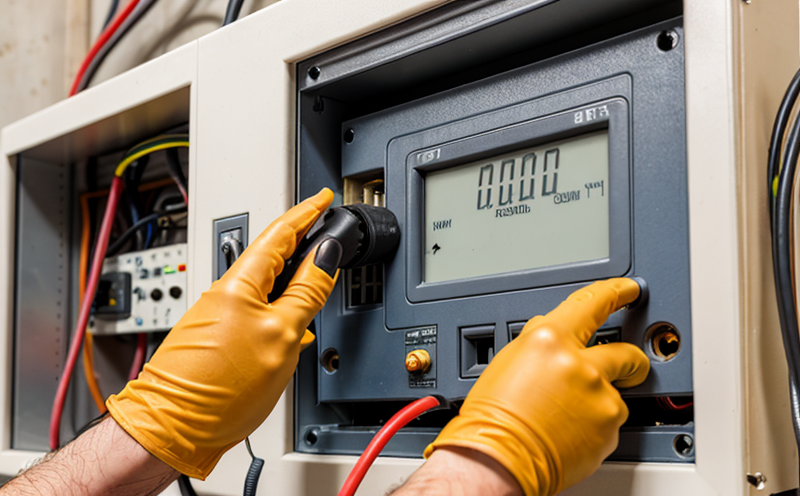IEC 62619 Functional Testing of Industrial Lithium-Ion Batteries
The IEC 62619 standard is a crucial document that provides requirements and recommendations for the functional testing of industrial lithium-ion batteries. This test ensures that these batteries meet stringent safety, performance, and operational standards before they are deployed in high-stress environments such as electric vehicles, large-scale energy storage systems (ESS), and industrial applications.
The standard covers a broad range of tests designed to evaluate various aspects of the battery's behavior under different operating conditions. These include charge-discharge cycles, temperature cycling, vibration testing, and endurance tests. Compliance with IEC 62619 is essential for ensuring that batteries are reliable, safe, and perform optimally in demanding industrial settings.
When selecting a laboratory to perform these tests, it's important to ensure they have the appropriate expertise and facilities. Eurolab offers comprehensive testing services aligned with IEC 62619 standards, providing clients with accurate, reproducible results that are internationally recognized. Our state-of-the-art equipment and experienced technicians guarantee consistent and reliable outcomes.
The process begins with thorough preparation of the batteries according to specified protocols outlined in the standard. This includes conditioning the batteries under controlled environments to ensure they are at a stable state before testing commences. During the tests, real-world conditions are simulated as closely as possible, ensuring that any issues or performance anomalies can be identified and addressed.
The results of these tests are meticulously documented and reported in accordance with international standards. Reporting not only includes detailed test procedures but also recommendations for improvements based on test findings. This comprehensive approach ensures clients have a clear understanding of the battery's capabilities and limitations, facilitating informed decision-making regarding procurement and deployment strategies.
Compliance with IEC 62619 is increasingly important as industries adopt more advanced technologies that rely heavily on lithium-ion batteries. By adhering to this standard, manufacturers can enhance their product offerings while ensuring they meet regulatory requirements in multiple jurisdictions.
In summary, the IEC 62619 functional testing of industrial lithium-ion batteries plays a vital role in safeguarding quality and performance across various sectors. Eurolab's commitment to excellence ensures that clients receive top-tier service, backed by cutting-edge technology and experienced professionals who understand the nuances of this critical standard.
Eurolab Advantages
- Comprehensive Expertise: Our team comprises industry-leading experts with deep knowledge in IEC 62619 compliance.
- State-of-the-Art Facilities: Equipped with the latest testing equipment to ensure accurate and reliable results.
- International Recognition: Results are aligned with international standards, ensuring global acceptance.
- Customized Solutions: Tailored testing protocols that meet specific client requirements.
- Consistent Quality: Reproducible results across multiple tests for high reliability and trustworthiness.
- Compliance Support: Assistance with navigating regulatory landscapes to ensure seamless compliance.
International Acceptance and Recognition
The IEC 62619 standard is widely recognized across the globe for its rigorous approach to functional testing of industrial lithium-ion batteries. Many countries have adopted this standard as a benchmark for quality assurance, reflecting its importance in ensuring safety and reliability.
European Union (EU) directives often incorporate elements of IEC standards into their regulations, emphasizing the importance of conformity with such international benchmarks. Similarly, other regions like North America and Asia-Pacific also value compliance with these standards due to their stringent requirements for industrial applications.
The acceptance of IEC 62619 goes beyond mere compliance; it fosters trust among stakeholders by demonstrating a commitment to excellence in product development and manufacturing processes. This standardization helps reduce barriers to market entry, promoting fair competition and innovation within the industry.
Furthermore, international recognition enhances brand reputation, making products more attractive to potential buyers worldwide. Companies that adhere strictly to these standards can leverage this advantage to gain competitive edge over counterparts who do not meet such stringent criteria.
Use Cases and Application Examples
- Electric Vehicles (EVs): Ensuring long-lasting performance in harsh environmental conditions.
- Large-Scale Energy Storage Systems: Guaranteeing consistent power supply during peak demand periods.
- Industrial Equipment: Enhancing reliability and safety across diverse industrial applications.
- Solar Power Plants: Optimizing energy storage solutions for sustainable operations.
- Transportation Sector: Meeting stringent safety regulations imposed by regulatory bodies worldwide.
- Manufacturing Industries: Improving operational efficiency through optimized battery performance.
The diverse range of applications highlights the versatility and necessity of IEC 62619 in various sectors. By adhering to these standards, companies can ensure their products meet global expectations while maintaining high levels of safety and reliability.





